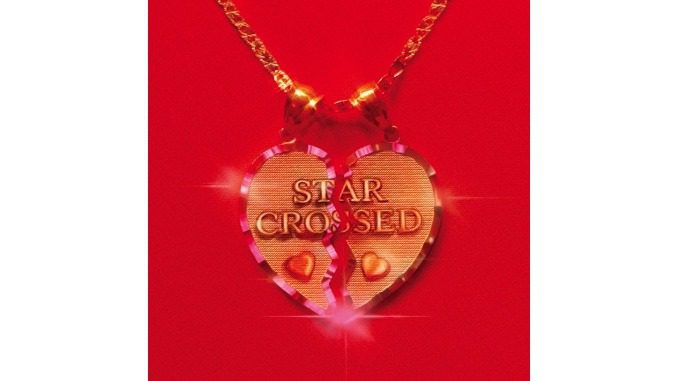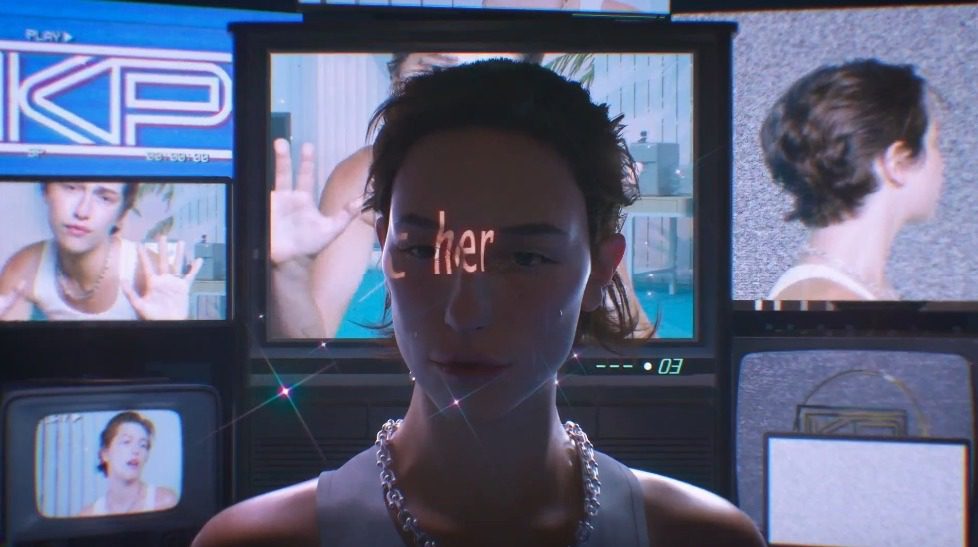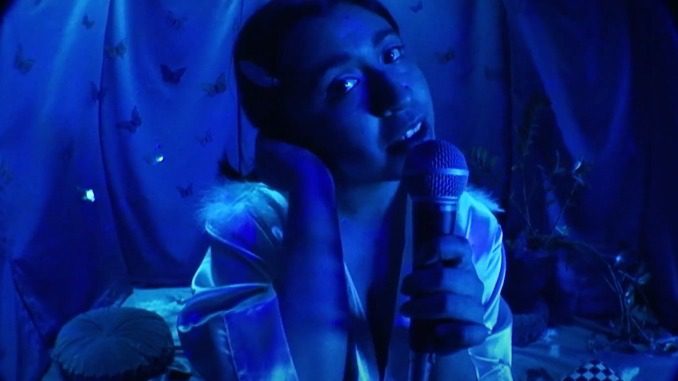For as long as Kacey Musgraves has been writing great songs, she’s been delivering the dark with the light, the good with the bad. You can hear that juxtaposition on “Merry Go ‘Round,” the bittersweet melody about universal letdowns from her high-kicking debut Same Trailer Different Park, or within Golden Hour’s cautiously optimistic “Happy & Sad.” There are of course many joints to be rolled and much joy to be shared throughout her discography albums, but anyone who thinks Musgraves is all “Rainbow”s and “Butterflies” should go back and listen again.
So it shouldn’t be a surprise—or a disappointment—that on star-crossed, her follow-up to 2018’s boundary-smashing Golden Hour, Musgraves dwells a bit more on the dark. What she calls a “modern tragedy,” star-crossed chronicles her divorce from fellow country auteur Ruston Kelly in three acts: their relationship’s demise, the dismantling, and then the path forward. She again recruited Golden Hour producing pair Daniel Tashian and Ian Fitchuk to work their magic on star-crossed, and while the result can’t quite touch the otherworldly iridescence of Musgraves’ magnum opus and Grammy Album of the Year winner (though, to be fair, few albums can), star-crossed is still a hell of a listen. And more importantly, it finds Musgraves chasing what it seems like she ultimately wants most: unbridled creative freedom.
Musgraves has been puzzling those who might wish to box her in since the release of genre-fluid ballad “Space Cowboy,” the lead single from Golden Hour, if not long before that. Beloved by Nashville and New York magazine alike, Musgraves seemingly doesn’t want (or need) to define herself. She toured with Harry Styles and did a stint at the Grand Ole Opry in the same touring cycle, and no one blinked. She’s trendy, yet traditional, and her music has always played with country conventions while bucking expectations at the same time. And while Golden Hour marvelously melded Musgraves’ tongue-in-cheek turns of phrase with strokes of studio-pop bliss, star-crossed abandons genre altogether.
Throughout the album’s 47 minutes, Musgraves never settles on one mood or sound. She offers to “set the scene” of the tragedy on the opening title track, which beckons with a flurry of flamenco-inspired strings (which return at the album’s close on her chilling all-Spanish cover of Violetta Parra’s “Gracias a la Vida”). Then she rolls right into one of the album’s best songs, the plea for marital instincts “Good Wife,” which combines the easy acoustic pop of 2000s hitmakers like Natasha Bedingfield with layers of the AutoTune Musgraves flirted with on Golden Hour’s lush “Oh, What A World” to dazzling effect. The song’s intro is also eerily similar to that of Avril Lavigne’s “Complicated,” which just sounds really damn cool.
While there are new tones at play, the psychedelic song structures and woozy, effortless pop melodies that recruited a rush of new Musgraves fans with Golden Hour are back again on star-crossed. And just as with Golden Hour, Musgraves once again turned to “plant therapy” while writing (in this case, a guided mushroom trip that resulted in the “big bang” conception of the record), which may have helped cultivate the album’s free-flowing feel despite leaning into the great country tradition of really sad songs.
There’s the rose-toned “Cherry Blossom,” whose metaphor about springtime in Tokyo doesn’t quite land, but it successfully implements a nod to Musgraves’ affection for Japanese culture and a hypnotic soundscape. And like so many of Musgraves’ best songs about men who can’t get out of their own way (Pageant Material’s “Miserable”; Golden Hour’s disco smash “High Horse”), the groovy, R&B-inspired “Breadwinner’’ lambasts an insecure clout-chaser who wants it both ways: a girl who will pay for his supper but still play trophy wife. And in perhaps an unfortunate closing scene to Golden Hour’s “Lonely Weekend,” Musgraves attempts the unenviable task of getting back out there to navigate the dating pool on the mournful acoustic tune “Hookup Scene.”
Musgraves winks at another Golden Hour counterpart on the nostalgic “Simple Times,” which, much like “Happy & Sad,” is about that feeling when we can’t be fully present, because we’re either anxious about the future or distracted by the past. “Being grown up kind of sucks,” she adds, reminiscing on hangouts at the mall and aimless trips to 7-Eleven. On that same note, “Camera Roll,” a thoughtful lullaby not unlike Golden Hour’s “Mother,” considers the highlight reel we’re faced with every time we open Instagram. Musgraves asks on behalf of all of us, were we really happier back in 2016, or 2006, or whenever we took that picture with that ex? “Chronological order, and nothing but torture,” she sings while on a doom scroll. “But I can’t delete ‘em / It just doesn’t feel right yet.”
The spark that started on Golden Hour opener “Slow Burn,” which introduces us to the cloudless love story between Musgraves and Kelly, has since burst into a fit of flames that are now long- extinguished in the dark night of star-crossed. But, as she remarks on single “Justified,” “Healing doesn’t happen in a straight line.” Living through a divorce isn’t all sad, but it’s certainly not all happy, either. Pop music hasn’t bred many songs about divorce (just ask Seth Avett), so Musgraves was largely wading into uncharted waters in her quest to heal via music. She imagines how her marriage would have fared in the hands of Hollywood (“If This Was a Movie…”), and how things might have been different if she had been able to “save” the relationship (“Angel”). But, of course, there was no real way forward, and now she’s left to pick up the pieces.
Star-crossed might be better approached not as a singular tragedy, but rather as another chapter in Musgraves’ great songbook, or even a companion to Golden Hour, because neither exists without the other. There’s no heartbreak without love, but we wouldn’t bother with love if we didn’t know pain. Rather than only bemoan the collapse of the life she and Kelly built together, Musgraves approaches loss with gratitude for what they had before it all fell apart, and the knowledge that she could find connection again. With that in mind, there’s “a light at the end of the tunnel,” as she sings on the disco-folk (is that a thing?) banger “There Is a Light,” which also houses an unforgettable flute solo. The “tunnel” also happens to be lined with flickering neon lights, and maybe a disco ball here and there.
The star-crossed tracklist only suffers during a few mid-tier tunes like the sleepy “Angel,” dream-pop trip “Easier Said” (which contains a single burst of banjo) and “Keep Lookin’ Up” that ultimately distract from Musgraves’ dramatic production. The extra weight leaves me with the question, did Musgraves write this record because she felt like she had to, or because she actually had to—or else she’d collapse from carrying the weight of her pain? Either way, as long as the curtain is up, I’m happy to sit through a few extra numbers, because the high points are worth it.
Musgraves’ storytelling skills and musical instincts are as strong as ever on star-crossed. While it’s not perfect, love rarely is, and breakups never are. Musgraves told her fairytale, and now she’s owed the spotlight to tell her great tragedy. It doesn’t have to end like Romeo and Juliet, though. She ‘s not left entirely hopeless. Just as in nature, there’s usually one thing that follows the “golden hour”: darkness. But then? Light burns across the horizon again.
Ellen Johnson is a former Paste music editor and forever pop culture enthusiast. Presently, she’s a copy editor, freelance writer and aspiring marathoner. You can find her tweeting about all the things on Twitter @ellen_a_johnson and re-watching Little Women on Letterboxd.




